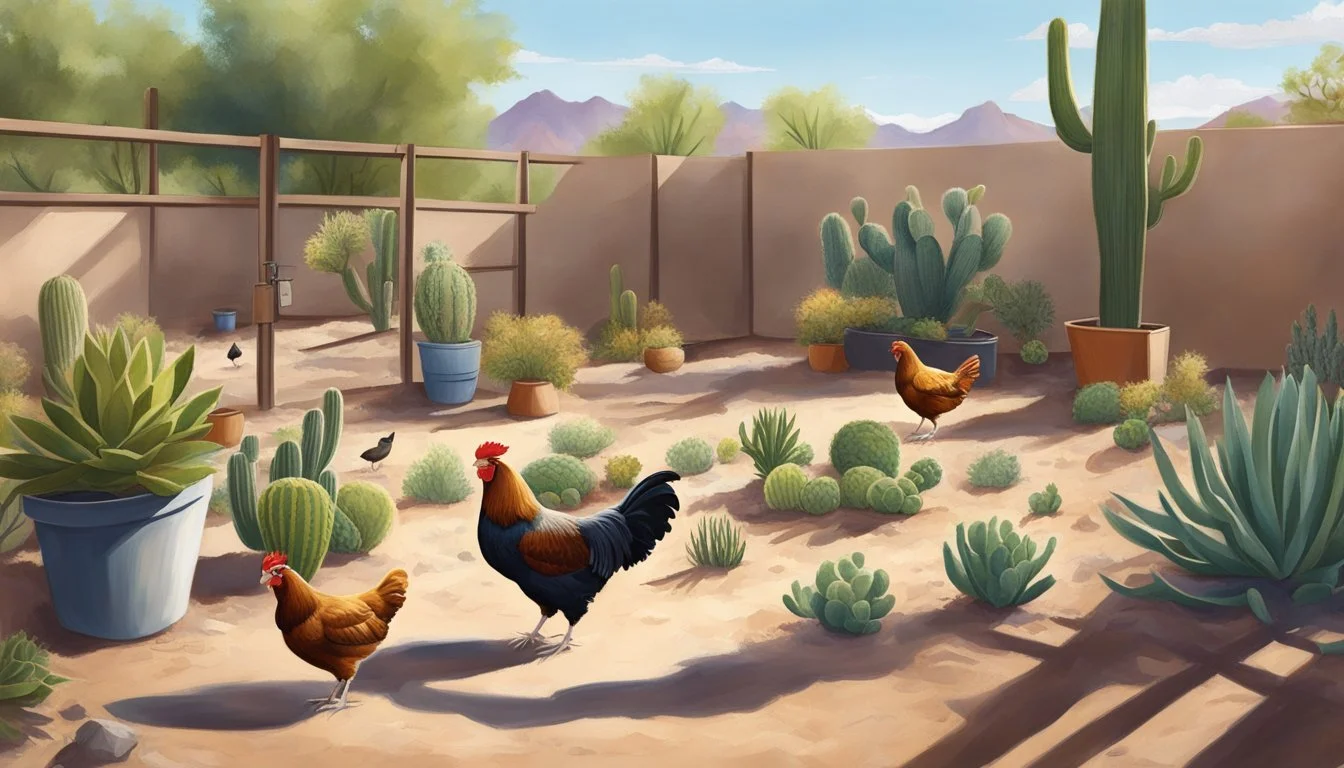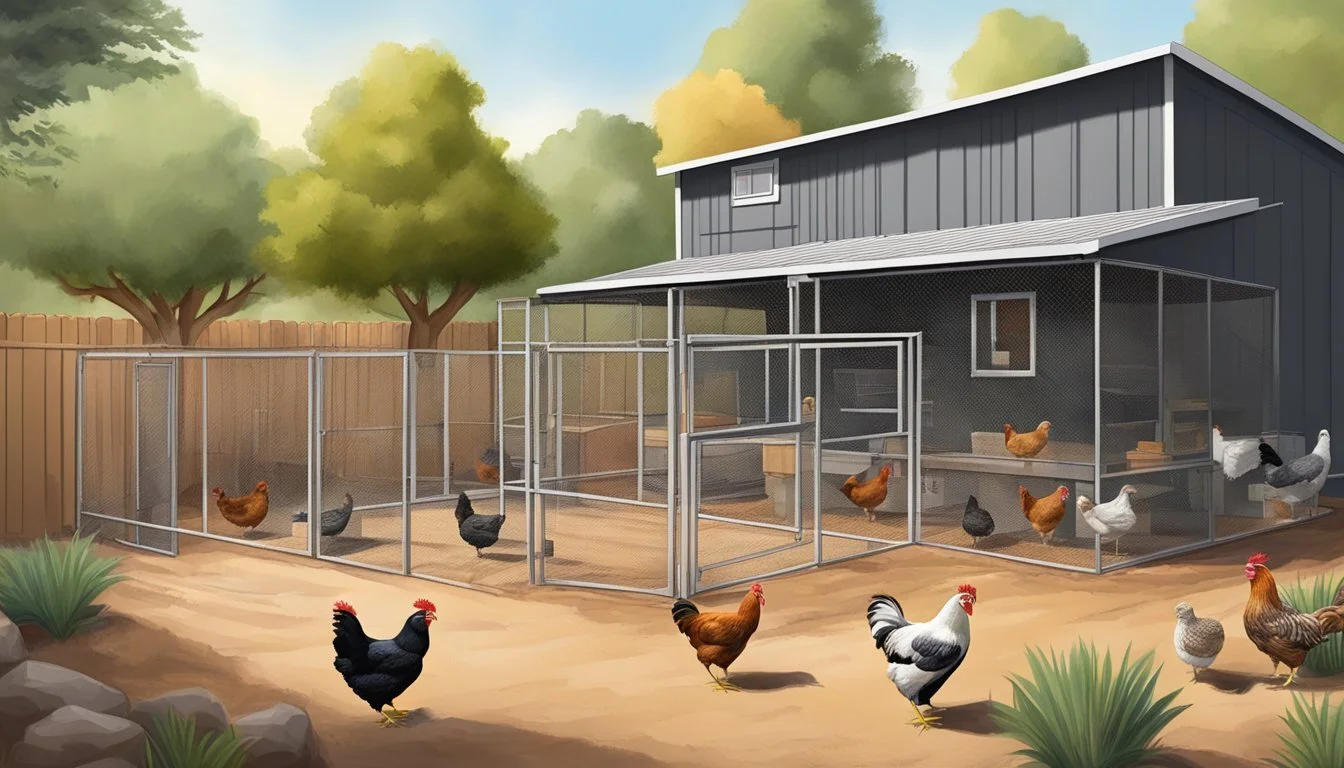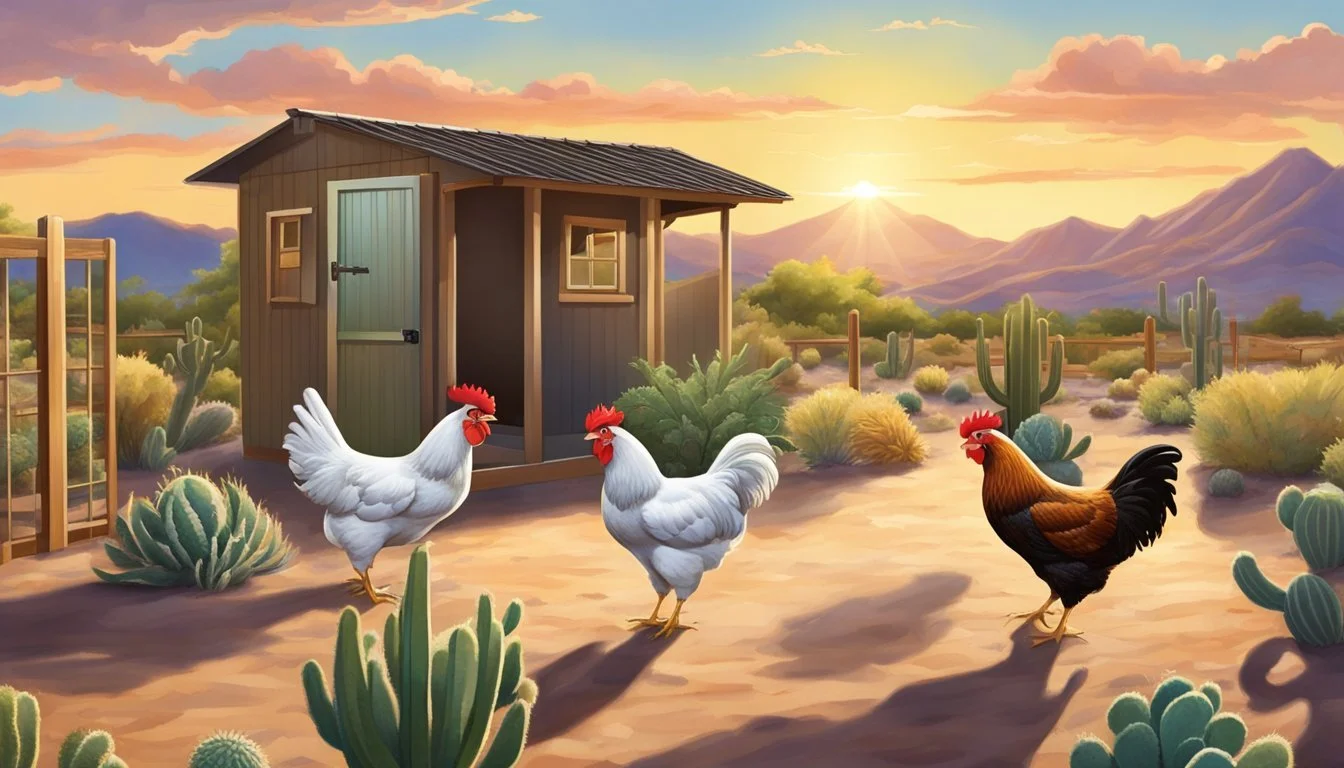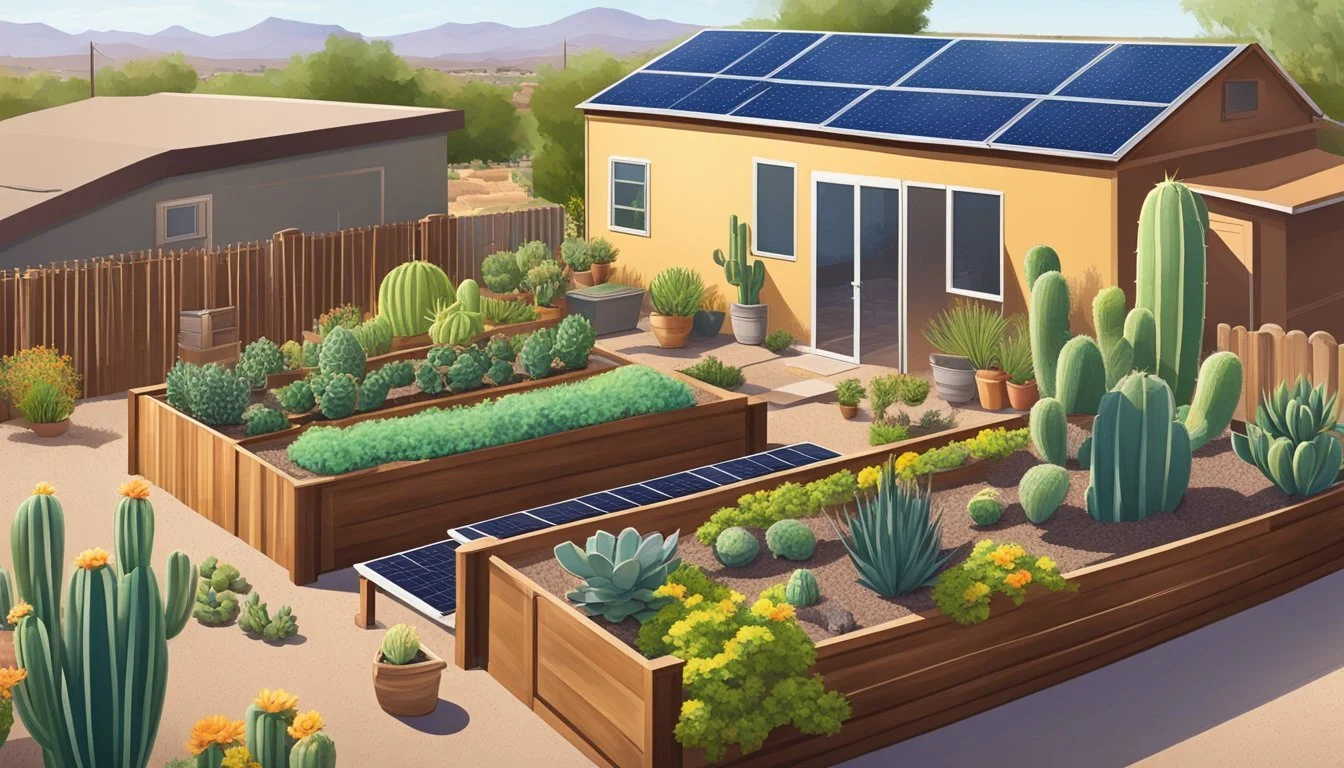Keeping Backyard Chickens in Tucson, AZ
A Practical Guide for Urban Poultry Farming
In Tucson, Arizona, the keeping of backyard chickens is a practice that offers numerous benefits, such as a steady supply of fresh eggs and the joy of raising your own pets. As urban homesteading gains popularity, Tucson residents are increasingly looking to integrate this sustainable practice into their daily lives. Before embarking on poultry-keeping, it's crucial for potential chicken owners to be well informed about local regulations to ensure compliance with city ordinances.
Chickens are permissible within the confines of Tucson's residential areas, provided that individuals adhere to specific guidelines. These regulations are in place to maintain public health and neighborhood harmony. For instance, while there is allowance for a certain number of chickens, roosters are generally not permitted within city limits to avoid noise disturbance. Additionally, those living in properties with homeowners associations should consult their HOA rules, as they can impose further restrictions on keeping backyard chickens.
The city's guidelines stipulate that any coops or enclosures for chickens must be kept clean and must meet the minimum distance requirements from neighboring residences. This ensures the well-being of the chickens and addresses any concerns neighbors might have regarding odors or noise. With proper management and consideration of local ordinances, raising chickens in Tucson can be a fulfilling endeavor for residents seeking a closer connection to their food sources and an enriching experience with these backyard birds.
Legal Framework in Tucson
In Tucson, AZ, the keeping of backyard chickens is regulated by a collection of local ordinances which homeowners must comply with to ensure responsible and legally sound poultry husbandry.
Understanding the Chicken Ordinance
In the city of Tucson, fowl, including chickens, are subject to specific local ordinances outlined in the Tucson City Code. These regulations stipulate that no more than 24 birds may be kept within city limits. Any coop or structure designed to house these birds must maintain a minimum distance of 50 feet from residential structures on neighboring properties, ensuring compliance with local nuisance laws.
Zoning and Permits
Zoning plays a crucial role in the legality of keeping chickens in Tucson. The residential zones permit the keeping of chickens, but it is imperative for residents to check their particular zoning regulations. Additionally, while a permit is not usually required to keep chickens, it is essential to verify this with the city since regulations can vary.
Homeowners' Association and Nuisance Laws
Local Homeowners' Associations (HOAs) may have additional rules that exceed city regulations. Residents must consult their HOA's covenants for any restrictions relating to the keeping of chickens. Furthermore, Tucson's nuisance laws provide frameworks to avoid issues such as excessive noise and odors, which must be adhered to for harmonious community living.
Urban Agriculture Text Amendment
The Tucson City Council has approved an urban agriculture text amendment to the Unified Development Code, allowing residents within city limits to raise backyard chickens and other food-producing animals. This amendment signifies Tucson's endorsement of urban agriculture, though all residents must still adhere to existing city ordinances and regulations.
Setting Up Your Chicken Coop
When setting up a chicken coop in Tucson, AZ, it's essential to select an appropriate location, design it for safety and protection, and safeguard against predators. Proper setup is crucial for the health and welfare of the chickens.
Choosing the Right Location
For the coop to comply with Tucson ordinances, it must be placed a minimum of 20 feet away from the neighbor's house, taking into account the lot and coop size. The coop should situate in a spot with adequate sunlight and shade, and on a high point to avoid flooding during rains.
Design and Safety
A coop needs to be constructed to keep chickens clean and sanitary. It should allow easy access for egg collection and maintenance. The coop requires:
An enclosed pen or run with at least four square feet per hen.
Roosts for chickens to perch during the night.
Ventilation to keep air fresh, but positioned to prevent drafts.
Sanitation: Regular cleaning to prevent diseases.
Protecting Against Predators
Chickens in Tucson are at risk from predators such as coyotes, hawks, and raccoons. Protection measures include:
Enclosing coops and runs with chicken wire or stronger hardware cloth.
Secure latching on doors to prevent predator access.
Regular checks for holes or weak points in the enclosure.
Careful consideration of these factors will help ensure a safe and hospitable environment for backyard chickens.
Chicken Care and Management
Proper care and management are essential for a healthy backyard flock in Tucson. This section offers guidance on feeding, maintaining health and hygiene, and ensuring the behavioral well-being of your chickens.
Feeding Your Flock
Chickens require a balanced diet rich in nutrients. Owners should provide a constant supply of clean water and a quality layer ration that meets their flock's nutritional needs, especially during Tucson's hotter months. It's advisable to feed chickens in the cooler hours of early morning or late evening to encourage feed consumption and reduce heat stress.
Health and Hygiene
The key to preventing disease and parasites like mites is maintaining good coop hygiene. A strict cleaning regimen should include:
Regular Coop Cleaning: Remove droppings and spent bedding at least once a week.
Sanitation: Disinfect waterers and feeders regularly to prevent the spread of disease.
Pest Control: Keep coops free of mites and pests by using appropriate treatments.
Odor Control: Proper coop ventilation and cleanliness will minimize odors, a sign of poor sanitation.
Behavior and Well-being
Stress, cannibalism, and pecking are behaviors that can indicate issues with management or flock dynamics. To reduce stress and aggressive behaviors, ensure:
Adequate Space: Provide at least two square feet per hen inside the coop.
Environmental Enrichment: Offer perches, dust baths, and space for foraging.
Flock Observation: Keep an eye on flock dynamics to catch and address pecking or bullying early.
Stress Reduction: Shade, ventilation, and cool water during extreme heat help keep chickens comfortable and reduce stress.
Proper care, combined with attentive management, ensures your chickens remain healthy and productive members of your backyard environment.
Community Engagement and Resources
Engaging with the local community is a cornerstone for those keeping backyard chickens in Tucson, AZ. Not only does it strengthen urban agriculture efforts, but it also ensures compliance with local regulations and fosters positive neighborly relationships.
Local Feed and Supply Stores
Tucson's urban farmers can find a wealth of resources at local feed and supply stores. These establishments are pivotal for providing the necessary food, equipment, and expert advice crucial for raising healthy backyard chickens. For instance, stores such as Arizona Feeds Country Store offer a variety of chicken breeds, feeds rich in nutrition, and coops that are suitable for the Sonoran Desert climate.
Interaction with Neighbors
Positive interaction with neighbors is essential to maintain a harmonious community atmosphere when raising backyard chickens. Chicken owners are encouraged to inform neighbors of their poultry endeavors, address any potential concerns, and maintain proper enclosures to prevent any nuisances. Mitigating noise and odor complaints proactively is key in upholding good relations and preventing disputes.
Contributions to Local Agriculture
The contributions of backyard chicken enthusiasts to local agriculture are multifaceted. By participating in community gardens and farmers markets, urban farmers support the local food system. The amendment to Tucson's city policies has indeed lessened barriers, encouraging more residents to engage in growing food locally, whether through planting vegetable gardens or tending to their flock, thereby enhancing Tucson's urban agriculture landscape.
Advanced Topics
In Tucson, AZ, when the keeper of backyard chickens steps beyond hobbyist care into the realms of breeding, commercial activity, or civic engagement, they confront a new set of complexities. Addressing these requires an awareness of local laws, animal management best practices, and channels for policy discourse.
Breeding and Selling
In Tucson, breeders must adhere to zoning laws which permit residential areas to keep chickens, yet one should verify specific regulations and Homeowners Association (HOA) rules. Selling chickens or eggs falls under regulatory scrutiny and may require adherence to health and safety standards. Breeders are responsible for managing roosters, as their presence may lead to noise complaints, categorized under nuisances.
Zoning Compliance: Ensure activities meet Tucson's zoning regulations.
Health & Safety: Follow standards for selling food-producing animals.
Raising Other Fowl
Tucson's climate allows for the raising of various fowl, but one must carefully consider the city's regulations concerning each species. Chickens are commonly allowed, but raising geese or other fowl could have different restrictions. Keepers should remember that all coops and runs for housing birds must be at least 50 feet from neighboring residential structures to maintain sanitation and minimize nuisances.
Coop Placement: Minimum of 50 feet from neighboring residences.
Species Regulations: Check local ordinances for non-chicken fowl restrictions.
Engaging with City Governance
Engagement with the Tucson City Council is vital for individuals looking to influence urban agriculture policies. Advocates for backyard chickens or other food-producing animals may attend council meetings to voice concerns or support for existing and potential legislation. Being informed and respectful in discourse ensures a better reception of one’s viewpoints.
City Council Meetings: Attend to discuss fowl-related urban agriculture policies.
Policy Advocacy: Advocate effectively by understanding the current ordinances.
Potential Challenges and Solutions
When keeping backyard chickens in Tucson, AZ, poultry enthusiasts may face various challenges including neighborhood complaints, disease management, and waste disposal, which can be effectively managed with the right strategies.
Dealing with Complaints
Complaints generally arise from nuisance issues such as noise, odors, or even chickens wandering into neighboring properties. They should address these complaints promptly and respectfully. Mitigation strategies can include:
Noise Management: To reduce potential noise complaints, avoid keeping roosters which are known for their loud crowing. Only hens are usually necessary for non-breeding purposes.
Odor Control: Regular cleaning of the coop and proper manure management help prevent odorous conditions that can bother neighbors.
Preventing and Addressing Disease
Disease can be a significant issue for chicken owners, emphasizing the importance of effective prevention and timely response. Key measures include:
Regular Veterinary Care: Schedule check-ups for the flock to ensure they are healthy and up to date on necessary vaccinations.
Sanitation Practices: Maintain rigorous sanitation practices such as cleaning feeders, waterers, and the coop itself to minimize disease spread.
Managing Waste
The proper handling of manure and chicken waste should be a top priority for any backyard poultry keeper. Effective waste management practices reduce smell, fly problems, and the potential for disease. Here are some tips:
Composting: Chicken manure can be valuable for composting. A well-balanced compost system turns waste into nutrient-rich fertilizer for gardens.
Regular Clean-Up: Establish a routine for removing waste from the chicken coop to prevent build-up and maintain a healthy environment for the chickens.
Integration with Home Gardening
Integrating chickens into home gardens offers numerous benefits, from pest control to natural fertilization. Tucson residents can harmonize their gardening efforts with their chicken care to create a symbiotic relationship between the two.
Chickens in the Garden
Chickens can be beneficial companions for a vegetable garden in several ways. They naturally forage for pests such as beetles and grubs, which helps in reducing the need for chemical pesticides. However, one must monitor their interaction with the garden carefully, as chickens can also damage tender plants and vegetables. Square foot fencing can be utilized to designate specific areas for chickens to roam and aid in garden pest control while protecting the more vulnerable sections of the garden.
Composting with Manure
Chicken manure is high in nitrogen, making it an excellent choice for composting and enriching garden soil. Tucson residents can collect the manure, combine it with their regular compost, and allow it to break down adequately before integrating it into the garden soil. This process not only recycles waste but also improves soil structure and fertility for robust vegetable growth. It is critical to ensure that the manure has properly aged to avoid the potential for burning plants with excessive nitrogen content.
Creating a Sustainable Ecosystem
A sustainable ecosystem within a residential backyard combines the mutual benefits of chickens and gardens. The birds' foraging reduces food waste by consuming table scraps while providing nutrient-rich manure. This approach fosters a closed-loop system where waste is minimized, and resources are circulate within the garden environment, contributing to both plant and chicken health.
By thoughtfully incorporating chickens into the home garden, Tucson residents in residential areas can maximize their garden’s productivity and ecological health. Chickens enhance garden upkeep, manure serves as an effective fertilizer, and collectively they support a sustainable living space.









